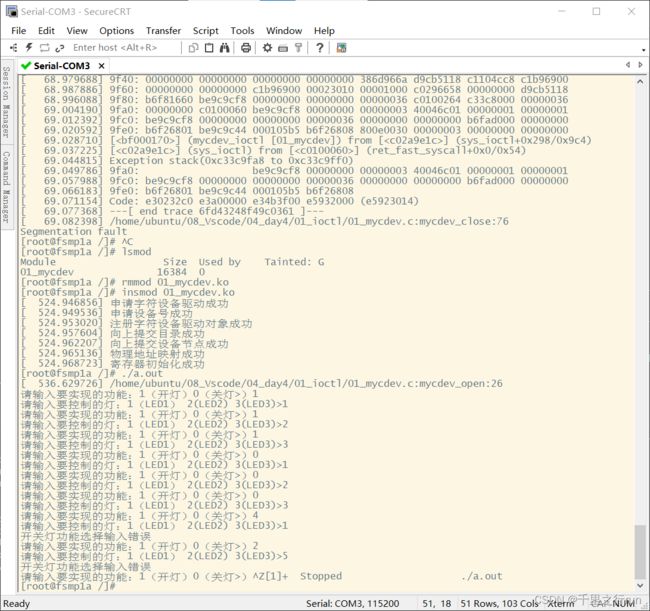驱动DAY4 字符设备驱动分步注册和ioctl函数点亮LED灯
头文件
#ifndef __HEAD_H__
#define __HEAD_H__
typedef struct{
unsigned int MODER;
unsigned int OTYPER;
unsigned int OSPEEDR;
unsigned int PUPDR;
unsigned int IDR;
unsigned int ODR;
}gpio_t;
#define PHY_LED1_ADDR 0X50006000
#define PHY_LED2_ADDR 0X50007000
#define PHY_LED3_ADDR 0X50006000
#define PHY_RCC_ADDR 0X50000A28
#define LED_ON _IOW('l',1,int)//开灯
#define LED_OFF _IOW('l',0,int)//关灯
#endif
驱动代码
#include
#include
#include
#include
#include
#include "head.h"
#include
#include
struct cdev *cdev;
unsigned int major = 0;
unsigned int minor = 0;
dev_t devno;
struct class *cls;
struct device *dev;
char kbuf[128] = {0};
gpio_t *vir_led1;
gpio_t *vir_led2;
gpio_t *vir_led3;
unsigned int *vir_rcc;
// 封装操作方法
int mycdev_open(struct inode *inode, struct file *file)
{
printk("%s:%s:%d\n", __FILE__, __func__, __LINE__);
return 0;
}
long mycdev_ioctl(struct file *file, unsigned int cmd, unsigned long arg)
{
// 根据用户空间功能码的不同实现硬件不同的控制
switch (cmd)
{
case LED_ON: // 开灯
switch (arg)
{
case 1:
vir_led1->ODR |= (0X1 << 10);
break;
case 2:
vir_led2->ODR |= (0X1 << 10);
break;
case 3:
vir_led3->ODR |= (0X1 << 8);
break;
default:
printk("灯选择输入错误\n");
break;
}
break;
case LED_OFF: // 关灯
switch (arg)
{
case 1:
vir_led1->ODR &= (~(0X1 << 10));
break;
case 2:
vir_led2->ODR &= (~(0X1 << 10));
break;
case 3:
vir_led3->ODR &= (~(0X1 << 8));
break;
default:
printk("灯选择输入错误\n");
break;
}
break;
default:
printk("开关灯选择输入错误\n");
break;
}
return 0;
}
int mycdev_close(struct inode *inode, struct file *file)
{
printk("%s:%s:%d\n", __FILE__, __func__, __LINE__);
return 0;
}
// 定义操作方法结构体遍历并且初始化
struct file_operations fops = {
.open = mycdev_open,
.unlocked_ioctl = mycdev_ioctl,
.release = mycdev_close,
};
int all_led_init(void)
{
// 寄存器地址的映射
vir_led1 = ioremap(PHY_LED1_ADDR, sizeof(gpio_t));
if (vir_led1 == NULL)
{
printk("ioremap filed:%d\n", __LINE__);
return -ENOMEM;
}
vir_led2 = ioremap(PHY_LED2_ADDR, sizeof(gpio_t));
if (vir_led2 == NULL)
{
printk("ioremap filed:%d\n", __LINE__);
return -ENOMEM;
}
vir_led3 = vir_led1;
vir_rcc = ioremap(PHY_RCC_ADDR, 4);
if (vir_rcc == NULL)
{
printk("ioremap filed:%d\n", __LINE__);
return -ENOMEM;
}
printk("物理地址映射成功\n");
// 寄存器的初始化
// rcc
(*vir_rcc) |= (3 << 4);
// led1
vir_led1->MODER &= (~(3 << 20));
vir_led1->MODER |= (1 << 20);
vir_led1->ODR &= (~(1 << 10));
// led2
vir_led2->MODER &= (~(3 << 20));
vir_led2->MODER |= (1 << 20);
vir_led2->ODR &= (~(1 << 10));
// led3
vir_led3->MODER &= (~(3 << 16));
vir_led1->MODER |= (1 << 16);
vir_led1->ODR &= (~(1 << 8));
printk("寄存器初始化成功\n");
return 0;
}
static int __init mycdev_init(void)
{
int ret;
// 1.分配字符设备驱动对象
cdev = cdev_alloc();
if (cdev == NULL)
{
printk("申请字符设备驱动对象失败\n");
ret = -EFAULT;
goto OUT1;
}
printk("申请字符设备驱动成功\n");
// 2.初始化字符设备驱动对象
cdev_init(cdev, &fops);
// 3.申请设备号
if (major > 0) // 静态指定
{
ret = register_chrdev_region(MKDEV(major, minor), 3, "mycdev");
if (ret)
{
printk("静态指定设备号失败\n");
goto OUT2;
}
}
else
{
ret = alloc_chrdev_region(&devno, minor, 3, "mycdev");
if (ret)
{
printk("静态指定设备号失败\n");
goto OUT2;
}
minor = MINOR(devno); // 根据设备号获取次设备号
major = MAJOR(devno); // 根据设备号获取主设备号
}
printk("申请设备号成功\n");
// 4.注册字符设备驱动对象
ret = cdev_add(cdev, MKDEV(major, minor), 3);
if (ret)
{
printk("注册字符设备驱动对象失败\n");
goto OUT3;
}
printk("注册字符设备驱动对象成功\n");
// 向上提交目录
cls = class_create(THIS_MODULE, "mycdev");
if (IS_ERR(cls))
{
printk("向上提交目录失败\n");
ret = -PTR_ERR(cls);
goto OUT4;
}
printk("向上提交目录成功\n");
// 向上提交设备节点信息
int i=0;
for (i = 0; i < 3; i++)
{
dev = device_create(cls, NULL, MKDEV(major, i), NULL, "mycdev%d", i);
if (IS_ERR(dev))
{
printk("向上提交设备节点信息失败\n");
ret = -PTR_ERR(dev);
goto OUT5;
}
}
printk("向上提交设备节点成功\n");
// 寄存器映射以及初始化
all_led_init();
return 0;
OUT5:
for (--i; i >= 0; i--)
{
device_destroy(cls, MKDEV(major, i)); // 释放提交成功的设备信息
}
class_destroy(cls); // 销毁目录
OUT4:
cdev_del(cdev);
OUT3:
unregister_chrdev_region(MKDEV(major, minor), 3);
OUT2:
kfree(cdev);
OUT1:
return ret;
}
static void __exit mycdev_exit(void)
{
// 销毁设备节点信息
int i;
for (i = 0; i < 3; i++)
{
device_destroy(cls, MKDEV(major, i));
}
// 销毁目录
class_destroy(cls);
// 注销字符设备驱动对象
cdev_del(cdev);
// 释放设备号
unregister_chrdev_region(MKDEV(major, minor), 3);
// 释放对象空间
kfree(cdev);
}
module_init(mycdev_init);
module_exit(mycdev_exit);
MODULE_LICENSE("GPL"); 测试代码
#include
#include
#include
#include
#include
#include
#include
#include
#include "head.h"
int main(int argc, char const *argv[])
{
char buf[128] = {0};
int a, b;
int fd = open("/dev/mycdev0", O_RDWR);
if (fd < 0)
{
printf("打开设备文件失败\n");
exit(-1);
}
while (1)
{
printf("请输入要实现的功能:1(开灯)0(关灯>)");
scanf("%d", &a);
printf("请输入要控制的灯:1(LED1) 2(LED2) 3(LED3)>");
scanf("%d", &b);
switch (a)
{
case 1:
ioctl(fd, LED_ON, b);
break;
case 0:
ioctl(fd, LED_OFF, b);
break;
default:
printf("开关灯功能选择输入错误\n");
break;
}
}
close(fd);
return 0;
}
Makefile
#通用makefile
modname ?= demo
arch ?= arm
ifeq ($(arch),arm)
KERNELDIR:= /home/ubuntu/FSMP1A/linux-stm32mp-5.10.61-stm32mp-r2-r0/linux-5.10.61
#生成ARM架构
else
KERNELDIR:= /lib/modules/$(shell uname -r)/build
#生成x86架构
endif
PWD:= $(shell pwd)
all:
make -C $(KERNELDIR) M=$(PWD) modules
clean:
make -C $(KERNELDIR) M=$(PWD) clean
obj-m:= $(modname).o
实验现象
